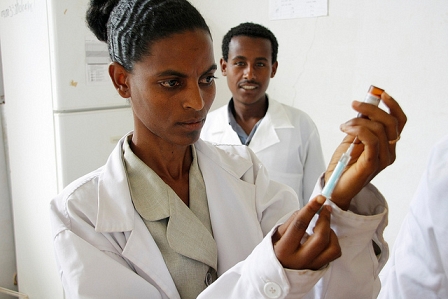Erstellt am: 4. 2. 2014 - 14:01 Uhr
"We Can't Treat Our Way Out Of The Problem"
- FM4 Reality Check Monday to Friday from 12.00 to 14.00, and after the show via Podcast fm4.orf.at/realitycheck.
Today is World Cancer Day and to mark the event the World Health Organisation has released what it has described as an "alarming" report warning of a "tidal wave of cancers" sweeping the globe.
The 800-page volume report, the first to be released in five years, was co-authored by the International Agency for Research on Cancer, or IARC. It says that every year 14 million people are told they have cancer and that figure is expected to rise to 25 million within 20 years – a 70% increase.
"We have got to think more about prevention." New Scientist's Andy Coughlin was at the launch of the new report in London: "The main message is that we can't go on thinking that we can treat ourselves out of cancer and solve it that way," he told FM4 Reality Check today. "We have got to think more about prevention."
Indeed the IARC believes that 50% of all cancers are preventable.
"The falling rates of lung cancer were really amazing.”
Some great strides have been made in the developed world in changing lifestyle habits to tackle the cancer burden.
"The most obvious one and the one which is having a huge impact in lots of countries around the world is giving up smoking," says Coughlin. "The graphs that were shown at the launch show a drastic drop in lung cancer in countries that have managed to cut down on the smoking problem were very impressive. The falling rates of lung cancer were really amazing."
Lung Cancer still the main killer
It's not all good news on the tobacco front. In the issue of prevention Austria, still muddling around with its "Austrian solution" is lagging behind much of the developed world and globally lung cancer remains the most commonly diagnosed form of the disease among men (16.7% of cases) with rising rates for women.
The disease also remains the biggest killer, contributing 23.6% of all cancer deaths.
Worryingly, says Coughlin, the progress made in the developed world is being "swamped by the huge rises in smoking in India and China. All the gains in the Western countries are being off-set by these losses, as it were, in the developing countries."
It's not just India and China; rates are also increasing in parts of the world where smoking was once rare, including Sub-Saharan Africa. "The tobacco companies have moved into countries where smoking rates were low," complains Amanda Sandford from ASH, a tobacco control advocacy group. "Now we are seeing the effect of their marketing as more poor people become addicted to tobacco and getting all the smoking-related diseases that are so common in the West."
Main burden in the developing world?
Indeed, the new WHO report says the biggest burden will be in low- and middle-income countries. This is partly because they are taking on some of our bad habits – not only are people in the developing world smoking more, they are eating more and becoming less physically active.
Over the past 20 years in South-East Asia, for example, journeys that were once made on foot or by bike are now being made by motorbike or car.
But the phenomenon is also, paradoxically, a result of better health care. Cancer remains a disease that predominately effects the older generations and as advances in medical care have helped defeat the burden of infectious disease more people are living long enough to be diagnosed with cancer.
Vaccinations Could Help
When it comes to preventing cancer cases in the developing world, Coughlin says that currently UN health planners might find "the biggest bang for their buck" in increasing access to vaccines "that are widely used and have proved successful in the West."
He points to the vaccine against HPV virus that is known to trigger cervical cancer. "In Sub-Saharan Africa 33% of the cancer deaths in women are attributable to infectious diseases such as the HPV virus while in Australia, where the vaccine is readily available, the rate is only 4%."
What About Alcohol?
Back in the West, the new WHO report also highlights the burden of alcohol-attributable cancers. Obviously linked to liver cancer deaths, alcohol has also been established as a risk for cancers of the mouth, oesophagus, bowel, stomach, pancreas, and breast.
The WHO says alcohol was responsible for a total of 337400 deaths worldwide in 2010. While this is much smaller than the nearly six million people the WHO says are killed by tobacco every year, it is noteworthy that Western society seems much more accepting of alcohol consumption with beer brands prevalent as sponsors of most major sporting events.
“White, pure and deadly?"
Meanwhile as obesity rates soar, there have been renewed calls to control the amount of sugar prevalent in food stuffs – with "sugary drink taxes" being mooted.
"It's certainly being treated as the new bad boy," says science journalist Andy Coughlin. “But I would say the evidence that sugar causes cancer is not fully pinned down."
There isn't even a causal relationship between sugar and obesity but rather, it seems, it is the overall calories that are important. The Week reports, Cubans have one of the world's highest rates of sugar consumption – between 60kg and 80kg per person – yet have far lower obesity and diabetes rates than Americans who consume "only" 36kg.
Clearly there are other aspects involved but it is fairly clear that if you are consuming a lot of calories and not burning them off, you are at risk of a number of preventable diseases.
The Future Battle?
So there are still of course gaps in our knowledge but we understand the biology of cancer better. In the West, in particular, treatments are becoming more sophisticated and more effective – and here Austria has proved a leading light. But the WHO report's co-author Dr Christopher Wild insists prevention remains better than a cure: "Our challenge is to translate this knowledge about the biology of cancer into ways to prevent the disease and detect it early."
At the end of the day it is the responsibility of individuals to change their own behaviour, but experts say national governments have a duty to support them and make those changes easier. For example, for decades haranguing people to stop smoking didn't work, but in many European countries state measures to de-normalize Smoking have enjoyed great success in a relatively short period.
As Cancer Research's Jean King told the Guardian: "People can cut their risk of cancer by making healthy lifestyle choices, but it's important to remember that the government and society are also responsible for creating an environment that supports healthy lifestyles."




